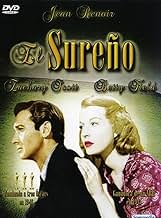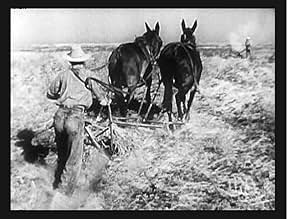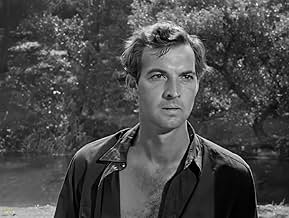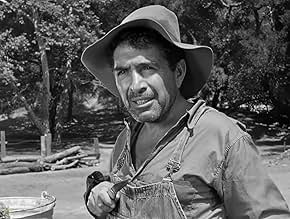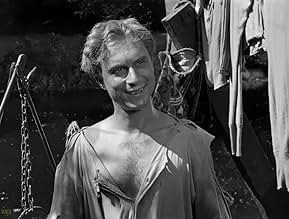NOTE IMDb
7,1/10
4,1 k
MA NOTE
La vie de la pauvre famille Tucker dont les membres travaillent comme bourreurs de coton et qui décident de s'installer à leur compte, mais la nature est contre eux.La vie de la pauvre famille Tucker dont les membres travaillent comme bourreurs de coton et qui décident de s'installer à leur compte, mais la nature est contre eux.La vie de la pauvre famille Tucker dont les membres travaillent comme bourreurs de coton et qui décident de s'installer à leur compte, mais la nature est contre eux.
- Réalisation
- Scénario
- Casting principal
- Nommé pour 3 Oscars
- 3 victoires et 3 nominations au total
Paul E. Burns
- Uncle Pete
- (as Paul Burns)
Audley Anderson
- Townsman
- (non crédité)
Rudy Bowman
- Townsman
- (non crédité)
Avis à la une
Here we have the movie that Jean Renior considered his favorite of all his American efforts. It's truly a forgotten gem from this great director.
It involves the Tucker family, a hard-working but poor clan who toil in the cotton fields as day workers. The family is led by Sam, played by Zachary Scott, accompanied by his lovely wife Nona played by Betty Field. They are accompanied by Beulah Bondi's ornery Granny Tucker, two small children and a frisky little dog. They represent the best of America's hard-working poor, with Sam and Nona truly being dedicated to each other and their family.
We are introduced to them as they pluck cotton beneath the burning sun, hauling huge sacks stuffed with the crop. Suddenly an elder member of the family falters and he is quickly aided by his nephew and his wife, Sam and Nona. Sam takes his uncle's load of cotton, telling him that he'll finish his row. Nona Tucker stays with the old man as he languishes in the fields, flies buzzing around him as he sweats and wheezes. Sam soon rushes back after delivering his cotton, and Nona informs him that his uncle "isn't doin' too good." They give the old guy water, and urge him to hold on, but with his dying breath he tells his young relatives, "...grow your own crop." This advice Sam truly takes to heart, and soon asks his sympathetic boss to let him farm a piece of land on a kind of rent-to-own deal. Sam and Nona's experiences making a life on this fallow piece of land are the focus of the movie.
Truth be told, I've always found talented Betty Field to be one of Hollywood's most unsung and under-appreciated actresses. She seems to generate some vague aura of tragedy, with subtle underpinnings of a quiet sexuality. Her voice has a low register, which also can have a beautiful clear resonance that is unique and memorable. Betty Field was the main reason I was so excited to finally be able to view "The Southerner." And I certainly was not disappointed! Her Nona and Scott's Sam are extremely believable as soul mates and married lovers, and there is a certain erotic electricity in there quiet scenes together.
Zachary Scott'character is earnest, sensitive and ultimately heroic, and his presence lends a quiet soft-spoken American spirit to the proceedings and he voices a soft Southern accent to perfection. His Sam Tucker is intelligent, brave, and determined, and the movie really gives him the opportunity to demonstrate his strength and prowess. Scott is wiry and strong, and his performance is athletic and inspiring. One can easily believe him to be the kind of man who would inspire the love and dedication of his wife and family. His obvious intelligence, goodness and his determination help make his long and difficult journey extremely involving. After a major catastrophe, when Sam experiences dark feelings of hopelessness, Zachary Scott truly conveys the reality of a common guy who questions all his decisions and abilities.
Jean Renoir's ability to capture the distinctly American essence of these characters is remarkable for a director from Europe. He certainly has a fascination and love for the land, and uses the landscape to reinforce the emotional high points of the film. In one remarkable scene, when the couple's young son battles an illness, Nona runs from the family's house into the freshly plowed field, crying as her husband follows her. She throws herself down onto the dirt and hugs the soil as she weeps, and confesses her innermost feelings. Renoir seems to almost turn the dirt and mud of this field into a third character in the scene.
But yes, there are a few elements in "The Southerner" that must disqualify it from masterpiece status. One disconcerting thing was the Hollywood makeup on Betty Field, who was never without mascara and lip gloss even when picking cotton or burning brush off a field. She certainly looked lovely, but also inappropriate for the movie. And the expert character actress Beulah Bondi has some moments where Renoir allowed her to perhaps play it a little too broadly. She's much of the comic relief in the film, and serves this purpose well, but her crotchetiness does begin to grate somewhat. And unfortunately the superb Blanche Yurka is underused as Sam's mother, and she appears so suddenly that it seems some of her scenes must have been cut. Percy Kilbride plays a thankless role as Yurka's suitor, and his screen time could have been used more efficiently.
But other supporting player deliver wonderful little turns in the film. There's Charles Kemper as Sam's rotund best friend and city slicker, Tim. He's likable and warm, and the narration that opens the film is his. He is perhaps the polar opposite of Sam in appearance and philosophy, and lends a voice to the advantages of city living. Then we have J. Carroll Naish as a terse and bitter neighbor who supplies much dramatic impact in his scenes with good guy Sam. The deliberate and thoughtful interplay between these two characters is packed with tension and foreboding. Norman Lloyd as Naish's nasty lowlife farmhand gives a unique performance and seems to bring an almost animalistic quality to his character. Also Dorothy Granger is both frightening and sad as a drunken barroom floozy who doesn't run from a fight.
"The Southerner" could probably be considered "The Grapes of Wrath, Lite." But to view it that way certainly underestimates its own power, and its relevance even today. Stripped to its essence, the movie could be the tale of any close-knit family who struggles to survive and to flourish in an uncaring world. Renior's talent, with the help of a great cast, makes "The Southerner" an impressive portrait of the struggles and rewards of American farm life. It has the ability to resonate in the memory because of both its Hollywood artistry and its gritty Southern strength.
It involves the Tucker family, a hard-working but poor clan who toil in the cotton fields as day workers. The family is led by Sam, played by Zachary Scott, accompanied by his lovely wife Nona played by Betty Field. They are accompanied by Beulah Bondi's ornery Granny Tucker, two small children and a frisky little dog. They represent the best of America's hard-working poor, with Sam and Nona truly being dedicated to each other and their family.
We are introduced to them as they pluck cotton beneath the burning sun, hauling huge sacks stuffed with the crop. Suddenly an elder member of the family falters and he is quickly aided by his nephew and his wife, Sam and Nona. Sam takes his uncle's load of cotton, telling him that he'll finish his row. Nona Tucker stays with the old man as he languishes in the fields, flies buzzing around him as he sweats and wheezes. Sam soon rushes back after delivering his cotton, and Nona informs him that his uncle "isn't doin' too good." They give the old guy water, and urge him to hold on, but with his dying breath he tells his young relatives, "...grow your own crop." This advice Sam truly takes to heart, and soon asks his sympathetic boss to let him farm a piece of land on a kind of rent-to-own deal. Sam and Nona's experiences making a life on this fallow piece of land are the focus of the movie.
Truth be told, I've always found talented Betty Field to be one of Hollywood's most unsung and under-appreciated actresses. She seems to generate some vague aura of tragedy, with subtle underpinnings of a quiet sexuality. Her voice has a low register, which also can have a beautiful clear resonance that is unique and memorable. Betty Field was the main reason I was so excited to finally be able to view "The Southerner." And I certainly was not disappointed! Her Nona and Scott's Sam are extremely believable as soul mates and married lovers, and there is a certain erotic electricity in there quiet scenes together.
Zachary Scott'character is earnest, sensitive and ultimately heroic, and his presence lends a quiet soft-spoken American spirit to the proceedings and he voices a soft Southern accent to perfection. His Sam Tucker is intelligent, brave, and determined, and the movie really gives him the opportunity to demonstrate his strength and prowess. Scott is wiry and strong, and his performance is athletic and inspiring. One can easily believe him to be the kind of man who would inspire the love and dedication of his wife and family. His obvious intelligence, goodness and his determination help make his long and difficult journey extremely involving. After a major catastrophe, when Sam experiences dark feelings of hopelessness, Zachary Scott truly conveys the reality of a common guy who questions all his decisions and abilities.
Jean Renoir's ability to capture the distinctly American essence of these characters is remarkable for a director from Europe. He certainly has a fascination and love for the land, and uses the landscape to reinforce the emotional high points of the film. In one remarkable scene, when the couple's young son battles an illness, Nona runs from the family's house into the freshly plowed field, crying as her husband follows her. She throws herself down onto the dirt and hugs the soil as she weeps, and confesses her innermost feelings. Renoir seems to almost turn the dirt and mud of this field into a third character in the scene.
But yes, there are a few elements in "The Southerner" that must disqualify it from masterpiece status. One disconcerting thing was the Hollywood makeup on Betty Field, who was never without mascara and lip gloss even when picking cotton or burning brush off a field. She certainly looked lovely, but also inappropriate for the movie. And the expert character actress Beulah Bondi has some moments where Renoir allowed her to perhaps play it a little too broadly. She's much of the comic relief in the film, and serves this purpose well, but her crotchetiness does begin to grate somewhat. And unfortunately the superb Blanche Yurka is underused as Sam's mother, and she appears so suddenly that it seems some of her scenes must have been cut. Percy Kilbride plays a thankless role as Yurka's suitor, and his screen time could have been used more efficiently.
But other supporting player deliver wonderful little turns in the film. There's Charles Kemper as Sam's rotund best friend and city slicker, Tim. He's likable and warm, and the narration that opens the film is his. He is perhaps the polar opposite of Sam in appearance and philosophy, and lends a voice to the advantages of city living. Then we have J. Carroll Naish as a terse and bitter neighbor who supplies much dramatic impact in his scenes with good guy Sam. The deliberate and thoughtful interplay between these two characters is packed with tension and foreboding. Norman Lloyd as Naish's nasty lowlife farmhand gives a unique performance and seems to bring an almost animalistic quality to his character. Also Dorothy Granger is both frightening and sad as a drunken barroom floozy who doesn't run from a fight.
"The Southerner" could probably be considered "The Grapes of Wrath, Lite." But to view it that way certainly underestimates its own power, and its relevance even today. Stripped to its essence, the movie could be the tale of any close-knit family who struggles to survive and to flourish in an uncaring world. Renior's talent, with the help of a great cast, makes "The Southerner" an impressive portrait of the struggles and rewards of American farm life. It has the ability to resonate in the memory because of both its Hollywood artistry and its gritty Southern strength.
The opening shot amounts to a wonderfully compelling hymnal to the land and those who toil there, while the rest of the movie attempts to follow through with that noble theme. There's no doubt that this is one of the most laudable movie projects to come out of the decade. But for all the earnest concern, there's still too much of the theatrical for my liking. I know, the film is generally hailed by critics, and there's much to be said for its consistent down-and-dirty look at the plight of the southern share-cropper. But there's also a staginess to many of the characters and scenes that blemishes director Renoir's naturalistic approach.
Consider Beulah Bondi's over-the-top turn as Granny. She's supposed to offer amusingly caustic comments on events as relief from the rigors of the plot. The trouble is that both she and the camera rub our nose in the role. They just as well have hung a sign around her neck saying "crusty old woman". The bad make-up job doesn't help either and serves as a constant reminder that the Tuckers are after all only a make-believe family. Since she's a central character, the flaws in her wild eye-rolling performance are hard to ignore.
The other acting is fine, especially from Scott in the lead role as Sam. However, both he and wife Nona (Field) are more stereotypes than multi-dimensional people. He's the noble, tireless worker, and so is she. Together, they are unwavering in their support of each other and the farm. And when Sam does waver after the flood, it's Nona providing the strength to persevere. Thus, it's the whole family and not just Sam plowing the field that will make the farm a success. That's a good point for the script to make. The trouble is that Sam and Nona are simply too good to be believable in the face of all the adversity. At least one breakdown scene where the emotional toll of the wrenching burdens is expressed would have added a more human dimension. Writer Renoir is simply too insistent on the nobility of the two characters, turning them more into symbols than complex real people.
On the other hand, the hostile neighbor Devers (Naish) is the most interesting of the characters. His dark resentful nature would appear to come from uncredited co-writer William Faulkner who specialized in such Gothic personalities. The real agonizing story of what it means to start up a farm is told by the embittered old man in what I take to be the movie's central scene. He's made a success, but that success has made him hard and mean, and now he lives in fear of anyone rising above him. I wish the screenplay had not betrayed that dark impact for the price of a big fish in what strikes me as a very implausible turn- around scene on the riverbank.
The film's virtues are pretty obvious. There's a real effort at showing rural poverty and its effects on people, never a Hollywood biggie. When little Daisy lovingly puts on the crude blanket-coat, I was reminded of a world so easily passed over in a nation of commercialized malls. Ditto the well-done possum feast, where the simple act of eating means so much more. And especially when the family and we gather around the little hearth fire to peer into the glow through eyes much more ancient than our own. These are indelible scenes that transcend the movie screen and alone are worth the price of the movie.
Maybe it took a European auteur outside the usual studio framework to want to deal as honestly as possible with such a non-commercial theme. But the location shooting and insistence on the unglamorous, even down to the very unHollywood barfly, add up to what looks like an effort at honest depiction. Of course, Renoir's well-known humanism and rollicking humor show up in the party scene in what amounts to a folk celebration of life and community. Then too, there's that telling scene between Sam and Tim (Kemper) where each comes to appreciate the contributions of the other in supplying the community's needs. Whatever the film's regrettable flaws, the message remains a powerful one that needs constant retelling, especially in our own cynical times. Too bad Renoir didn't stay on this side of the Atlantic. His influence on our own movie-makers would have pushed them in a much needed direction.
Consider Beulah Bondi's over-the-top turn as Granny. She's supposed to offer amusingly caustic comments on events as relief from the rigors of the plot. The trouble is that both she and the camera rub our nose in the role. They just as well have hung a sign around her neck saying "crusty old woman". The bad make-up job doesn't help either and serves as a constant reminder that the Tuckers are after all only a make-believe family. Since she's a central character, the flaws in her wild eye-rolling performance are hard to ignore.
The other acting is fine, especially from Scott in the lead role as Sam. However, both he and wife Nona (Field) are more stereotypes than multi-dimensional people. He's the noble, tireless worker, and so is she. Together, they are unwavering in their support of each other and the farm. And when Sam does waver after the flood, it's Nona providing the strength to persevere. Thus, it's the whole family and not just Sam plowing the field that will make the farm a success. That's a good point for the script to make. The trouble is that Sam and Nona are simply too good to be believable in the face of all the adversity. At least one breakdown scene where the emotional toll of the wrenching burdens is expressed would have added a more human dimension. Writer Renoir is simply too insistent on the nobility of the two characters, turning them more into symbols than complex real people.
On the other hand, the hostile neighbor Devers (Naish) is the most interesting of the characters. His dark resentful nature would appear to come from uncredited co-writer William Faulkner who specialized in such Gothic personalities. The real agonizing story of what it means to start up a farm is told by the embittered old man in what I take to be the movie's central scene. He's made a success, but that success has made him hard and mean, and now he lives in fear of anyone rising above him. I wish the screenplay had not betrayed that dark impact for the price of a big fish in what strikes me as a very implausible turn- around scene on the riverbank.
The film's virtues are pretty obvious. There's a real effort at showing rural poverty and its effects on people, never a Hollywood biggie. When little Daisy lovingly puts on the crude blanket-coat, I was reminded of a world so easily passed over in a nation of commercialized malls. Ditto the well-done possum feast, where the simple act of eating means so much more. And especially when the family and we gather around the little hearth fire to peer into the glow through eyes much more ancient than our own. These are indelible scenes that transcend the movie screen and alone are worth the price of the movie.
Maybe it took a European auteur outside the usual studio framework to want to deal as honestly as possible with such a non-commercial theme. But the location shooting and insistence on the unglamorous, even down to the very unHollywood barfly, add up to what looks like an effort at honest depiction. Of course, Renoir's well-known humanism and rollicking humor show up in the party scene in what amounts to a folk celebration of life and community. Then too, there's that telling scene between Sam and Tim (Kemper) where each comes to appreciate the contributions of the other in supplying the community's needs. Whatever the film's regrettable flaws, the message remains a powerful one that needs constant retelling, especially in our own cynical times. Too bad Renoir didn't stay on this side of the Atlantic. His influence on our own movie-makers would have pushed them in a much needed direction.
Life in Renoir films is always one damned thing - or one absorbing incident - after another, which is why the ideal Renoir film (a) sticks to the one subject, or the one place ("Grand Illusion" WOULD be as great as everyone says it is, if only it didn't wander about so), and (b) doesn't even purport to have a plot. (Not that the second requirement matters so much as the first.) In any case, the material Renoir had here suited him down to the ground. The fact that the central character is tied to the land, the fact that he has a clear goal (to survive by means of farming) without having any particular quest, allows Renoir to let whatever will happen, happen, without there being any danger of the film falling apart.
A delightfully warm film, but one with a real bite. It carries a real charge when the established farmer, after treating the newcomer with such unjustified coldness you start to feel he must be positively evil, begins to reveal his humanity and open up a little - only to describe, in detail, why he's so bitter - and determined to remain bitter. But this is just one perfectly realised scene among many. There's so MUCH to this film, not one segment of which could profitably be lost - except, of course, the minute-long spoken prologue, which contributes about as much to the overall effect as Cecil B. DeMille's anti-communist rant contributes to "The Ten Commandments". But ignore that last nit-pick.
A delightfully warm film, but one with a real bite. It carries a real charge when the established farmer, after treating the newcomer with such unjustified coldness you start to feel he must be positively evil, begins to reveal his humanity and open up a little - only to describe, in detail, why he's so bitter - and determined to remain bitter. But this is just one perfectly realised scene among many. There's so MUCH to this film, not one segment of which could profitably be lost - except, of course, the minute-long spoken prologue, which contributes about as much to the overall effect as Cecil B. DeMille's anti-communist rant contributes to "The Ten Commandments". But ignore that last nit-pick.
THE SOUTHERNER is notable for giving ZACHARY SCOTT his first real chance to shine as a promising new movie actor headed for stardom, teaming him with the always reliable BETTY FIELD as the wife of a dirt poor farmer in this Depression-era saga, uplifting despite the adversity of their situation due to Jean Renoir's fine direction.
"Grow your own crop," Scott, a Texas farmer, is told by his dying uncle. He struggles with his family to do just that--and THE SOUTHERNER becomes a tale of survival against the cruel twists and turns of nature. BEULAH BONDI is the stubborn Granny whose bark is worse than her bite, but she does tend to get annoying in her whining ways.
Working the land and making farmland self-supporting is never an easy matter and it gets plenty of negative treatment here with the odds against the struggling family at every turn. J. CARROLL NAISH and NORMAN LLOYD as hard-nosed neighbors make themselves utterly unlikeable (but believable) as Scott's uncooperative neighbors, unwilling to spare some milk for him when his son is ill. PERCY KILBRIDE comes to his rescue with a rented cow and later becomes his father-in-law, marrying BLANCHE YURKA.
But there are still hardships ahead, including a severe storm that destroys all the crops, serving to emphasize the man against nature theme of the entire story. Everything is destroyed but the human spirit.
Scott, Field and Bondi give heartfelt performances, with Bondi a bit over-the-top as Granny. It's not in the same class with THE GRAPES OF WRATH but it does create a sympathetic portrait of farmers who work the land.
Based on a novel called "Hold Autumn in Your Hand", it stands the test of time largely because of the performances.
"Grow your own crop," Scott, a Texas farmer, is told by his dying uncle. He struggles with his family to do just that--and THE SOUTHERNER becomes a tale of survival against the cruel twists and turns of nature. BEULAH BONDI is the stubborn Granny whose bark is worse than her bite, but she does tend to get annoying in her whining ways.
Working the land and making farmland self-supporting is never an easy matter and it gets plenty of negative treatment here with the odds against the struggling family at every turn. J. CARROLL NAISH and NORMAN LLOYD as hard-nosed neighbors make themselves utterly unlikeable (but believable) as Scott's uncooperative neighbors, unwilling to spare some milk for him when his son is ill. PERCY KILBRIDE comes to his rescue with a rented cow and later becomes his father-in-law, marrying BLANCHE YURKA.
But there are still hardships ahead, including a severe storm that destroys all the crops, serving to emphasize the man against nature theme of the entire story. Everything is destroyed but the human spirit.
Scott, Field and Bondi give heartfelt performances, with Bondi a bit over-the-top as Granny. It's not in the same class with THE GRAPES OF WRATH but it does create a sympathetic portrait of farmers who work the land.
Based on a novel called "Hold Autumn in Your Hand", it stands the test of time largely because of the performances.
I have a copy of this movie and have watched it several times. Most of my family has as well. My father has a speaking part in the movie. His name is Isadore J. Blanco and is the 17 year old that is featured while working out in the field. My father passed away On Veterans Day November 12, 1996. He was a wonderful human being and it's a joy to be able to see and hear him speak as a teenager.
Many of the younger generation do not know of the lives of these poor field working families. Many of the older children did not complete elementary school because working to put food on the table was much more important. Survival was what drove these families. Many young men later enlisted in the military to better their lives.
Many of the younger generation do not know of the lives of these poor field working families. Many of the older children did not complete elementary school because working to put food on the table was much more important. Survival was what drove these families. Many young men later enlisted in the military to better their lives.
Le saviez-vous
- AnecdotesBased on the novel "Hold Autumn in your Hand", by George Sessions Perry, which won the first National Book Award in 1941.
- GaffesWhen Finley whipped the cows the dog disappeared for a second Indicating a film cut.
- ConnexionsEdited into 365 days, also known as a Year (2019)
Meilleurs choix
Connectez-vous pour évaluer et suivre la liste de favoris afin de recevoir des recommandations personnalisées
- How long is The Southerner?Alimenté par Alexa
Détails
Box-office
- Budget
- 750 000 $US (estimé)
- Durée1 heure 32 minutes
- Couleur
- Rapport de forme
- 1.37 : 1
Contribuer à cette page
Suggérer une modification ou ajouter du contenu manquant

Lacune principale
By what name was L'homme du Sud (1945) officially released in India in English?
Répondre


